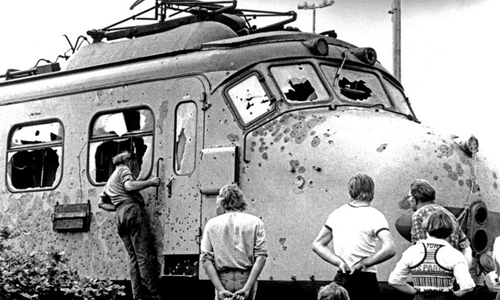Court puts 1977 train hijack back in spotlight
The Hague : A Dutch court Wednesday ordered an in-depth probe into the 1977 deaths of two Moluccan hostage-takers whom their families say were executed at point-blank range by marines as they stormed a hijacked train.
"The court has ordered an in-depth investigation to determine as clearly as possible what happened in the train," the Hague district court said.
"It wants to know more about the facts around the deaths of the two hijackers in order to determine whether there was indeed an execution, as claimed by the plaintiffs," it said in a statement, charging the government with carrying out the probe.
Relatives of hijacker Max Papilaja and co-conspirator Hansina Uktolseja -- the only woman in the group -- sued the state after seeing autopsy reports in 2013 which suggested they were shot at point blank range.
Dutch marines stormed a passenger train on June 11, 1977 in the small hamlet of De Punt in northern Netherlands, three weeks after it was hijacked by a group of nine Moluccan separatists who had taken hostage 55 passengers.
During a violent firefight when the train was riddled with bullets, six hostage-takers and two hostages were killed. Six other passengers were wounded.
The Dutch government has always maintained the operation to free the hostages was done according to the book and that the marines acted "with honest belief" in using deadly force in the heat of battle.
But Papilaja and Uktolseja's families say their relatives were executed -- and sued the state to admit guilt and pay damages amounting to around 55,000 euros ($59,000).
"I demand the truth. Why was my son murdered?" Papilaja's mother told the NOS newscaster when the hearing opened in November last year.
Moluccan separatists at the time of the hijacking were agitating for independence from Indonesia, of which it has been part since 1950.
Moluccans first arrived in The Netherlands in 1951 following Indonesia's independence in 1949, fearing reprisals after having fought on the side of the Dutch colonial army.
They planned to stay for only a few months before returning to an independent country, as part of negotiations at the time between the Dutch government and Indonesia.
Their wish however never materialised and some 12,500 Moluccans were left stranded in The Netherlands, crammed together in suburbs across the country.
The 1970s saw a number of violent actions by second-generation Moluccans, who felt betrayed by the Dutch for failing to secure their independent homeland.
Related Posts

